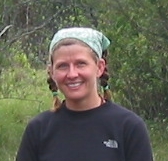
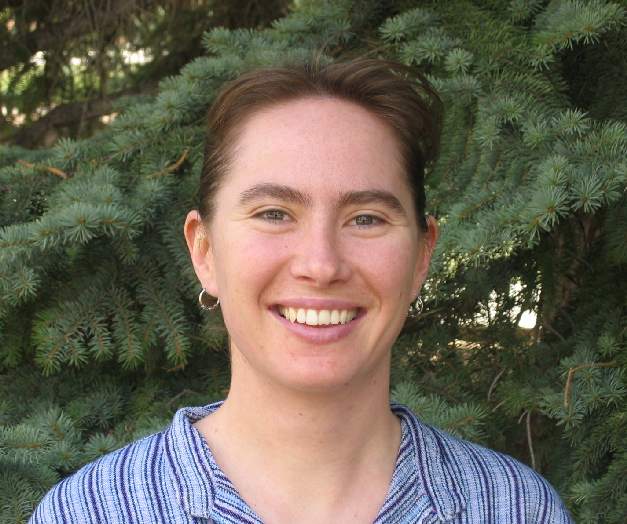
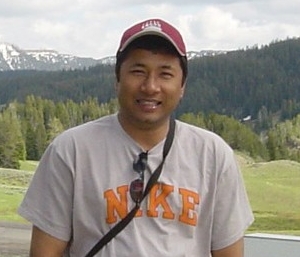
Recent SAWLS Press Releases & Success Stories
Miller nominated for Lawrence Meeboer Outstanding Teacher Award
Miller earns National award for research and tech transfer in hydrologic modeling
Two SAWLS Students Graduate with MS Degrees
SAWLS Students Receive Scholarship, Research, and Travel Awards
University of Wyoming Graduation Ceremony
Sudhir, Hannah & AJ win ASPRS scholarship awards
U.S., Kenya Unite to Improve Watershed Llife
Sudhir wins Graduate Student Presentation Award
Nepalese students find research home in college: UW College of Agriculture Agademics Article (200 Kb pdf)
Into Africa: Wyoming AlumNews Article (2.4 Mb pdf)
Recent MS Student Graduations (2007-2008)
| Tracy Baldyga, PhD in Rangeland Ecology and Watershed Management. Dissertation Title: Spatially Explicit Multiple Objective Decision Support for Rural Watersheds. Completion Date: December 2008. Now working with the International Water Management Institute (www.iwmi.org) in Accra, Ghana as a post-doctoral scientist. |
|
| Philip Baigas. MS student, Department of Renewable Resources, University of Wyoming. Thesis Title: Moose habitat selection, winter diet, and seasonal distribution mapping of moose in Southeastern Wyoming. Completion Date: December 2008. Now working with Wyoming game and Fish on a moose ecology study in the Greater Yellowstone Ecosystem, NW Wyoming. |
|
|
Hannah R. Griscom, MS student, Department
of Renewable Resources, University of Wyoming. Thesis
topic: Land cover and hydrologic assessments of the
upper Luvuvhu and Shingwedzi watersheds, South Africa:
steps towards integrated catchment management.
Completion date: May, 2007. Now working with the
Wyoming Natural Diversity Database (http://uwadmnweb.uwyo.edu/wyndd/)
as an ecologist.
|
|
|
Sudhir Raj Shrestha, MS student,
Department of Renewable Resources, University of
Wyoming. Dissertation topic: Remote mapping of soil
characteristics using heuristic rules and fuzzy logic.
Completion date: May. 2007. Now working with
Florida A&M University as a research scientist.
|
|
Recent SAWLS Student Awards (2004-2007)
Griscom, H. Graduate Student Travel Award for travel to Kruger National Park Research and Networking Meeting. Awarded by the UW Graduate School, the Department of Renewable Resources, the UW Division of Academic Affairs, and the Ruckelshaus School of Environment & Natural Resources ($1,500)
Wyckoff, T., 2006. Wyoming NSF/EPSCoR Program ($700)
Griscom, H., 2006. National Garden Clubs Scholarship ($4,000)
Venkatasamy, A., 2006. University of Wyoming International Student Scholarship ($1,000)
Shrestha, S.R., 2006. G.A. "Jim" and Marian Berger Endowed Graduate Scholarship. University of Wyoming College of Agriculture ($2,000)
Shrestha, S.R., 2006. Rocky Mountain Region American Association of Remote Sensing and Photogrammetry Student Scholarship ($1,000).
Griscom, H. Graduate Student Travel Award for Travel to AWRA Conference. Awarded by the UW Graduate School and the Department of Renewable Resources ($750)
Venkatasamy, A.. Graduate Student Travel Award for Travel to AWRA Conference. Awarded by the UW Graduate School and the Department of Renewable Resources ($750)
Shrestha, S. Graduate Student Travel Award for Travel to AWRA Conference. Awarded by the UW Graduate School and the Department of Renewable Resources ($750)
Tilaye, A. Graduate Student Travel Award for Travel to AWRA Conference. Awarded by the UW Graduate School and the Department of Renewable Resources ($750)
Griscom, H., 2005. Garden Club Scholarship ($2,000) Freeman, D., 2005. Rocky Mountain Region American Association of Remote Sensing and Photogrammetry Student Scholarship ($1,000).
Shrestha, S.R., 2005. Rocky Mountain Region American Association of Remote Sensing and Photogrammetry Student Scholarship ($1,500).
Griscom, H., 2005. Rocky Mountain Region American Association of Remote Sensing and Photogrammetry Student Scholarship ($1,000).
Cockrell, A.J., 2005. Rocky Mountain Region American Association of Remote Sensing and Photogrammetry Student Scholarship ($500).
Griscom, H., 2005. Graduate Student Committee Travel Award ($500).
Shrestha, S.R., 2004. Graduate Student Committee Travel Award ($500).
Baldyga, T.J., 2004. Graduate Student Committee Travel Award ($500).
Baldyga, T.J., 2004. Willard C and Elaine N. Rhoads Scholarship ($1,500).
Baldyga, T.J., 2004. UW Women�s Club Scholarship ($2,000)
SAWLS Graduates 3 People May 7, 2005
Tracy Baldyga received her MS hood in Rangeland Ecology and Watershed Management
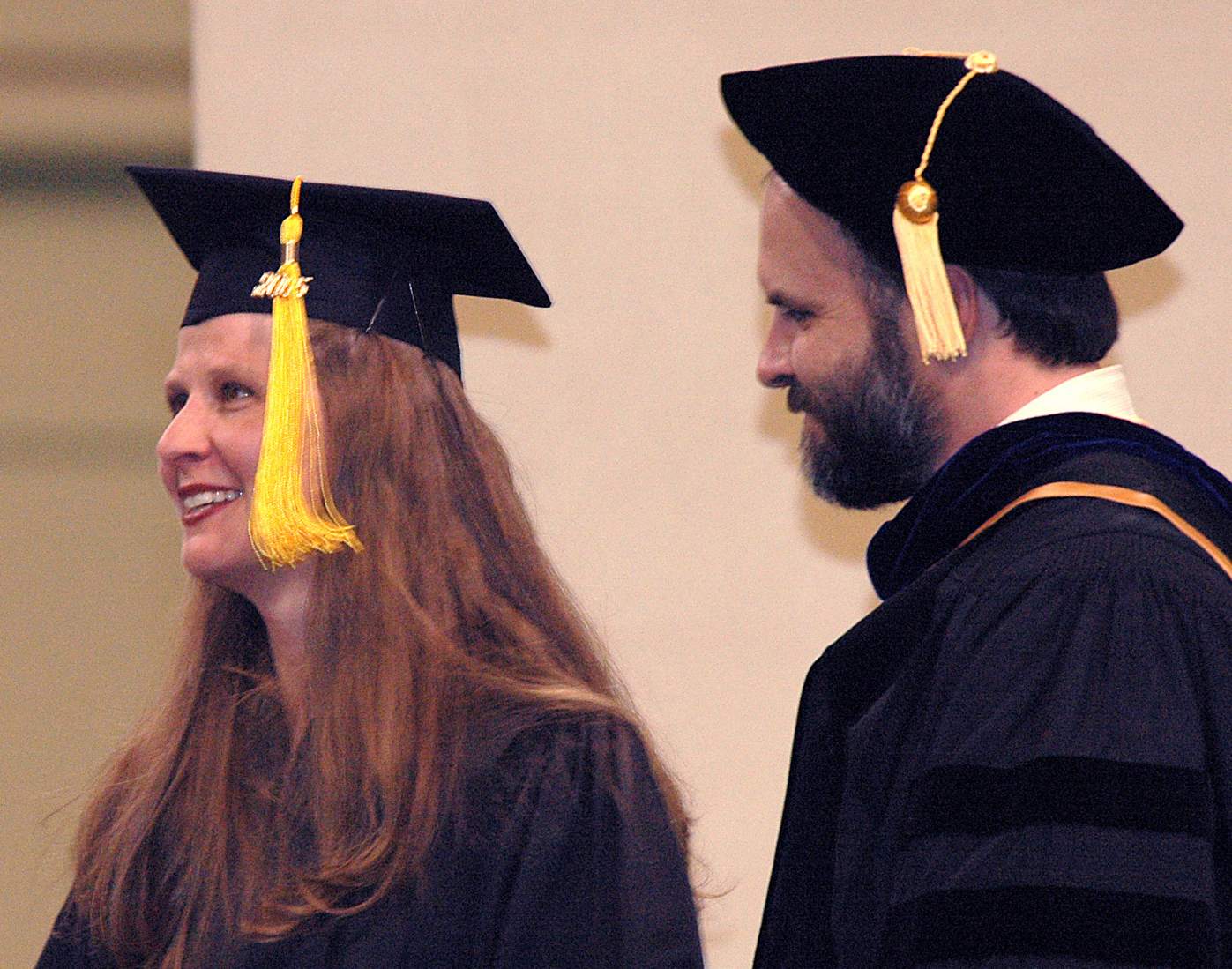
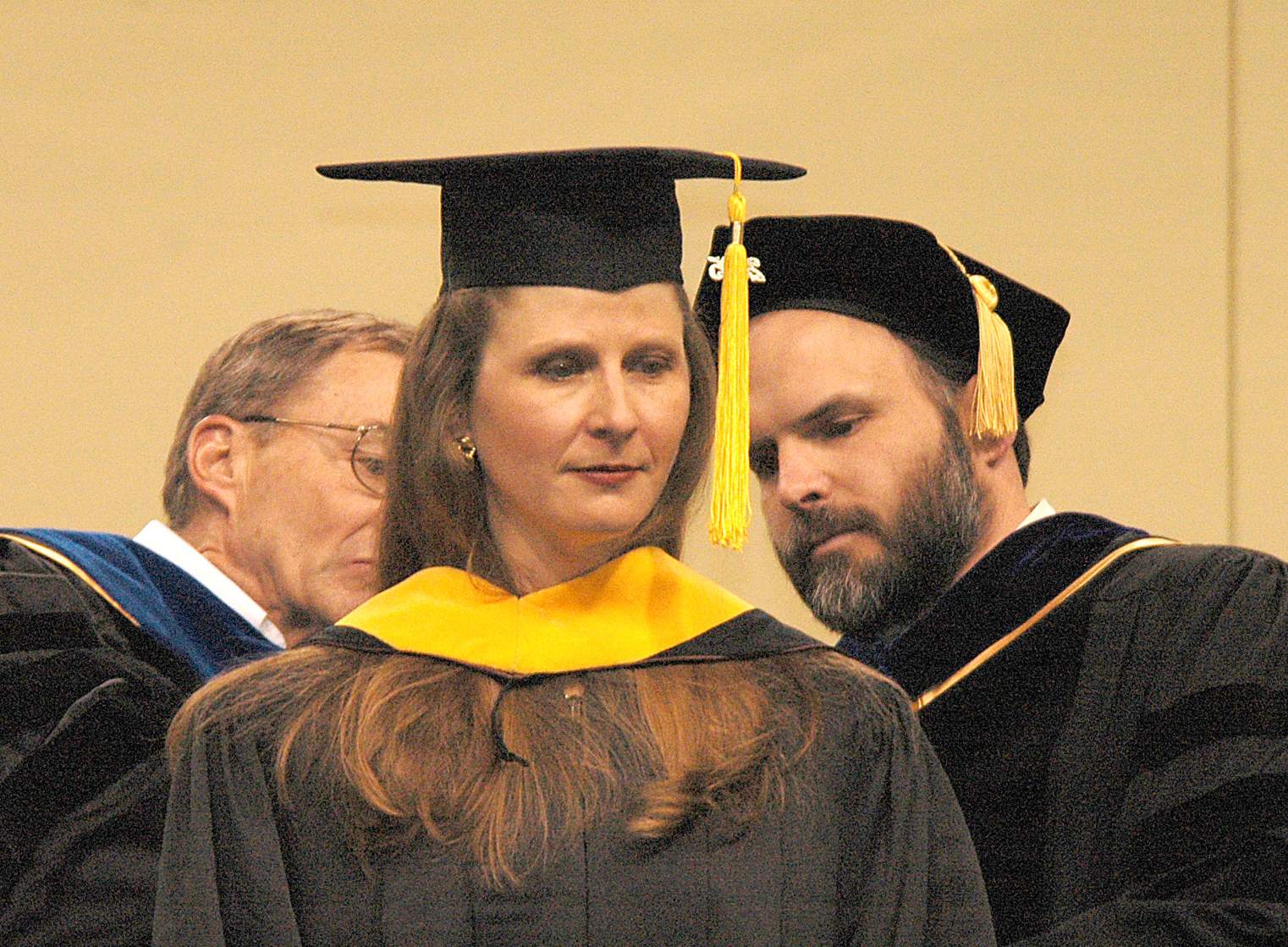
Photos Courtesy of Ken Driese
Colleen Boodleman received her BS in Agroecology
Prashant Patil received his MS degree in Electrical Engineering
Contact: Vicki Hamende, Senior Editor and Writer
January 18, 2005
FOUR UW STUDENTS WIN SCHOLARSHIPS
FOR RESEARCH INVOLVING REMOTE SENSING
Four graduate students in the University of Wyoming�s Department of Renewable Resources have won scholarships for their academic accomplishments and their use of Geographic Information Systems (GIS) or remote sensing in their research.
Awards of $1,000 each are being given to doctoral candidates Darrell Freeman of Brooksville, Fla., and Sudhir Raj Shrestha of Malangwa, Nepal. Master�s candidates Hannah Griscom of Santa Fe, N.M., and Angela Cockrell of Jerome, Idaho, will each receive $500.
The scholarships will be presented to the students by the Rocky Mountain Region Chapter of the American Society for Photogrammetry and Remote Sensing at the organization�s annual meeting Jan. 22 in Denver.
The society, which represents several states with proximity to the Rocky Mountains, is awarding a total of eight scholarships for 2005, and UW is the only institution to have more than three individual winners. According to a spokesman for the organization, the quality of applications for the funds was �stunning.�
Freeman�s research involves surveying range ecology and the invasion potential of Canada thistle. He is integrating field work with remote sensing and modeling to develop a technique to determine where land managers might need to face the weed.
Shrestha�s project centers on predictive soil mapping, using remote sensing and GIS to determine soil characteristics without having to actually visit the ground being studied.
Using South Africa as her area of focus, Griscom is involved in conservation planning and has developed linkages with research scientists in Kruger National Park near Johannesburg. She is using remote sensing to study the relationship between land coverage changes and environmental effects. Griscom is also incorporating community needs into watershed planning efforts.
Cockrell is seeking a way to extract the channel dimensions of streams from high-resolution terrain maps. This information can lead to improved hydrologic monitoring to determine if a landscape is stable, improving or degrading.
Freeman is working under the direction of Associate Professor Ann Hild while Shrestha, Griscom and Cockrell are students of Assistant Professor Scott Miller.
Contact: Vicki Hamende, Senior Editor and Writer
December 6, 2004
OUT OF AFRICA: U.S., KENYA UNITE TO IMPROVE WATERSHED LIFE
Conducting research in a third-world country sometimes requires the ability to improvise.
Two University of Wyoming graduate students discovered that they could meet this challenge.
The pair spent several weeks in Kenya, Africa, completing intensive field work to help classify and map the water and soil conditions of 400 sites in the ecologically troubled Njoro watershed, a major basin in the Rift Valley.
It was the second trip across the ocean for Tracy Baldyga, who will complete a master�s degree in May in rangeland ecology and watershed management.
Laura Thel, who is just beginning a doctoral program in the same field, will be traveling back to East Africa again between now and 2007 when she hopes to finish her dissertation.
The two, who are both originally from Washington, are collaborating with faculty members and students from UW, Moi and Egerton universities in Kenya, Utah State University and the University of California, Davis, on a five-year project funded by the U.S. Agency for International Development (USAID) to help restore the watershed to a sound and sustainable condition.
Poor agricultural practices in the area have led to increasing sedimentation and erosion. In addition, discharges from human waste and animal disposal are being mixed with the water needed by villagers for drinking, bathing, cooking, and laundering. The contaminated water leads to human disease and death as well as damage to aquatic and terrestrial plants and animals, they report.
Baldyga, who is interested in remote sensing and hydrologic modeling, says infrastructure weaknesses sometimes made it challenging for her to accomplish her research. �It was interesting because we had to improvise a lot. I discovered how to work with what might not be optimal data but to still come up with solutions. I guess I learned by being thrown into the fire,� she says.
The graduate student describes the watershed issues as �very sensitive topics,� explaining that those who depend on the forests are concerned about deforestation while agriculturists would like to be in charge of their land.
�It was a great opportunity to gain an understanding of what it would be like to work in a developing nation,� Baldyga adds.
Thel says they were delighted by the chance to interact with local residents along the watershed. �Every couple hundred meters we would stop to take a reading and make notations. People on the farms along the side of the road would cluster around us, curious about what we were doing,� she recalls.
Assistant Professor Scott Miller of the Department of Renewable Resources and Assistant Professor Si�n Mooney of the Department of Agricultural and Applied Economics are overseeing the efforts of the graduate students as well as making their own contributions to the research, which was started in 2002 by the Kenyan universities and African governmental institutions.
�The bulk of the work is done in Kenya by Kenyans,� Miller says. We help there and also spend time here doing data analysis and program review. Our students are plugged into their structure and are part of a group made up of Kenyans and people from the United States. We don�t view anyone as separate. We�re complete partners and are all part of this research team,� he explains.
�Everyone has a role and a task,� adds Mooney, who says she will be spending about two months a year studying the economic impacts of introducing new technologies in the Njoro watershed area and traveling back and forth to Africa to talk to stakeholders and gather information about income sources.
�The rural residents have very little in terms of housing and employment,� Mooney points out. �They have very few resources and no infrastructure.�
Miller�s focus is more biophysical. As a spatial processes ecologist, he investigates surface water hydrology, using geographic information systems and remote sensing to help determine the impacts of land cover change and human management on water quality, water quantity and stream-channel stability.
�We have been collecting baseline data and coming up with ways to suggest improvements in the watershed system. Next year we�ll try to put them in place,� he says.
The USAID funds are helping to pay for computers, printers, Internet access, textbooks and technology training programs for the African researchers.
A group of Kenyan faculty members and government officials spent three weeks visiting Wyoming and the university when the project began. Miller says proposals are being written to allow teachers and students from the sister institutions to spend three months in Laramie One Kenyan student will enroll at UW next year.
The eventual goal of the project, Miller says, is to produce measurable improvements in the watershed health and to expand the efforts to other sites in East Africa
�One of the huge values in international research is being exposed to other cultures and understanding what is affecting other people�s lives,� Miller says.
�We lead a sheltered existence, and projects like these help us gain an insight into what a majority of the people in the rest of the world are facing,� he adds.
�This isn�t just academics. We�re trying to work on things that affect people�s livelihoods. That�s worthy of our best attention, effort, involvement, and energy.�
###
March 10, 2004 -- Top students at the University of Wyoming won Best Presentation Awards during the recent UW Graduate Student Symposium.
The symposium included oral presentations and poster sessions to display the research achievements of UW graduate students. Awards were given for best presentation and best poster in each session.
"The symposium showcases graduate student achievement and provides a forum for UW graduate students to hone their skills at presenting research in a professional conference environment," says Don Roth, dean of the UW Graduate School.
Students receiving poster presentation awards are:
others....
Shrestha, Sudhir Renewable Resources